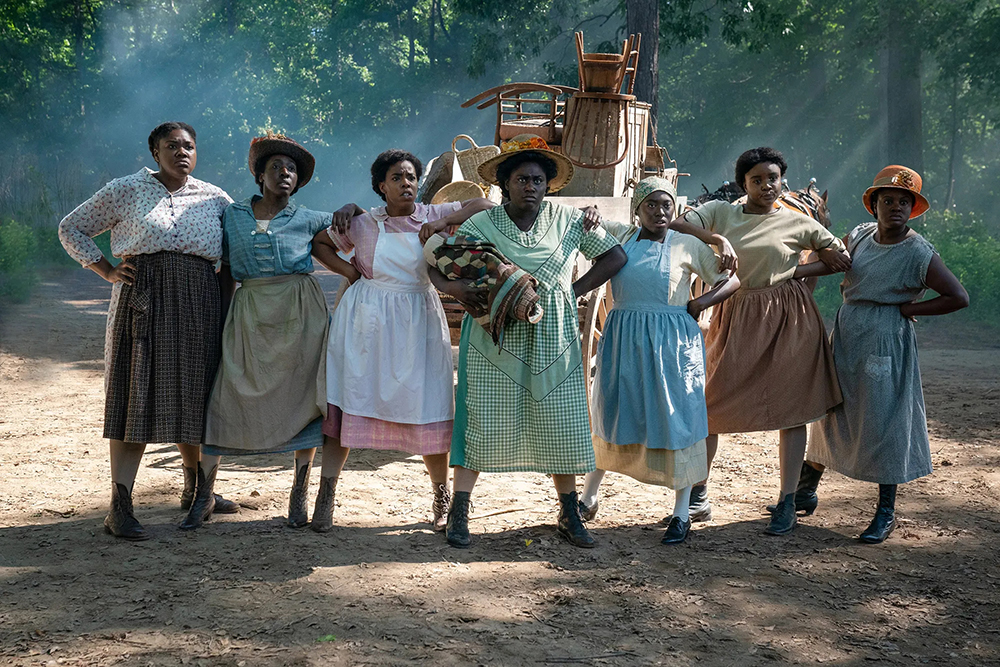Alice Walker’s 1982 novel The Color Purple is a revered novel that has inspired several adaptations. Written as a series of letters to God by an African-American woman named Celie, Walker’s novel spares no details of trauma and tragedy as Celie reaches for hope and self-empowerment.
The novel was an instant hit, and in 1985, it was adapted into a movie directed by Steven Spielberg with a score by Quincy Jones. The film not only marks Whoopi Goldberg’s breakthrough role, but stars Oprah Winfrey as Sofia, Danny Glover as Albert “Mister” Johnson, and Margaret Avery as Shug Avery.
The film was a huge success in 1985, but since then, most critiques stemmed from the decision to have a white director at the center of a story with such heavy themes of Blackness, as well as the source material’s overall use of explicit language and sexual details. The effectiveness of Walker’s and Spielberg’s works are not solely measured by their ability to withstand the test of time, but how the story resonates through the years.
In 2005, a Broadway musical version of The Color Purple used both the novel and film as inspiration. The original production garnered 11 Tony Awards, with a revival winning two more in 2016. Given the musical’s popularity, it was primed to be perfect source material for a silver screen adaptation.
Director Blitz Bazawule’s new film tells Celie’s story of tragedy to triumph in a softer, more condensed way. The film opens on the Georgia coast in the year 1909, where we meet the young versions of sisters Celie (Phylicia Pearl Mpasi) and Nettie (Halle Bailey) singing “Huckleberry Pie” while playing a hand-clapping game. The innocent scene is soon shattered, when we learn that Celie is pregnant by the man she knows as her father, Alfonso (Deon Cole).
We are then transported into a powerful gospel number, “Mysterious Ways,” sung by First Lady (Tamela Mann), Reverend Samuel Avery (David Alan Grier), and the congregation. Nettie’s infectious love for life shines through in the way she joins the congregation in praise and dance. Meanwhile, Celie sits quietly and observes.
When Celie gives birth to her son (with a Whoopi Goldberg cameo as the midwife) the miracle of childbirth is cut short. Alfonso takes Celie’s baby away, telling her the child is gone. This isn’t the first time this has happened, as Celie birthed another child, Olivia, who was also taken away. It’s obvious that Celie’s view on life is impacted greatly by this; however, she finds love and comfort in Nettie who brings her lessons and stories from school.
Nettie has caught the eye of an older widower known as Albert “Mister” Johnson (Colman Domingo). Moved by this infatuation, Mister asks Alfonso for Nettie’s hand in marriage, which Alfonso refuses, and instead offers him Celie. Mister is a cruel and abusive man, who repeatedly takes his anger out on Celie, while lamenting over his mistress, Shug Avery (Taraji P. Henson).
Tired of Alfonso’s sexual advances towards her, Nettie runs away and seeks refuge with Celie and Mister. However, this reunion is proved short-lived. When Nettie fights off Mister’s advances, he throws her out, too. The sisters endure another heartbreaking separation. Nettie promises to write every day. Years pass, and Celie (played as an adult by Fantasia Barrino) has yet to hear from Nettie, resulting in her questioning the goodness of God, and whether love exists for her in this world. As she continues to endure the hardships of life, primarily caused by Mister, she meets Sofia (Danielle Brooks), whose strong-mindedness and assertiveness are a bold contradiction to Celie’s demeanor. She also comes face to face with Shug Avery, who teaches her to observe the beauty of life, while learning the difference between suffering induced by God and man.
Bazawule’s iteration retains the crux of the story at its core. Most of the film’s power comes from the songs, while some significant story elements from previous versions have been omitted or toned down. We still sympathize with Celie for her hardships, but we’re not buried under the same avalanche of tragedies as we have seen in previous adaptations. Bazawule carefully works with the musical score, so as not to make a mockery of the story with song and dance numbers. Relying on the music could have potentially weakened the film, but the strength and commitment of the performers carry the day.
The Color Purple
Now playing
Multiple locations
